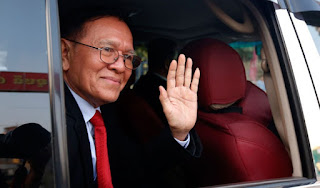Kem Sokha: ‘Change’ was call for ‘reform, not coup’
Buth Reaksmey Kongkea
The “change” catchphrase used by Kem Sokha during his time as CNRP vice-president was not meant to incite a coup to overthrow the government.
Sokha told the Phnom Penh Municipal Court yesterday that the “change” slogan was to reform government leaders through the democratic process.
“The change I advocated for was through free, fair and accountable national elections and also with no violence.
“I would like to emphasise again and again that the change that I had used and addressed to former CNRP demonstrators in 2013 was not to incite a coup or topple the government by the armed forces or through undemocratic ways.
“The change is for reforms,” Sokha said.
He
stressed that (the now defunct) CNRP had wanted to change the government
leaders through the national election, by free, fair and credible elections,”
he added.
Sokha also denied in court that he had conspired with foreign states or other foreign agents to overthrow the Cambodian government.
According to Sokha, the protest and demand of the CNRP in 2013 led to changes in Cambodia because the former CNRP and the ruling Cambodian People's Party (CPP) reached an agreement.
“Following the CNRP protest and demands in 2013, the two main political parties - CNRP and CPP –reached a political agreement with each other and we also made many changes in the top national institutions in the government until today,” he added.
“A Joint-Technical Working Group solved the political stalemate and talks led to changes in the state’s top institutions such as the composition or structure of the National Election Committee (NEC), the National Assembly and the Senate as well as other top institutions.
He also claimed that the “change” led the government to meet some of CNRP’s demands by increasing garment worker’s salaries to nearly $ 200 per month and the salaries of civil servants and the armed forces up to more than 1 million riels (about $250) a month.
“The
current government has also been reforming many leading structures of the
state’s institutions especially in the agricultural sectors by stopping
99-year-land concession to foreigners or private companies, and seizing land
concessions that were not developed after the companies were given the
entitlements for farmers for cultivating.
“These are the changes and the outcome of CNRP’s demonstration and demands in 2013. At that time, we demanded changes and now the government is doing it,” Sokha said.
One of Kem Sokha’s defense lawyers Chan Cheng said that the government’s current reforms and the increase in wages of the garment workers, civil servants, armed forces, and judges resulted from the “Change” demanded by former CNRP leaders, especially Kem Sokha in 2013.
Cheng said prosecutors should not use their powers to oppress his client to say that they wanted to get the “confession answers” from him in linking him with the foreign western diplomats or agents to convict Sokha.
“My client was an opposition politician. And what he had said while addressing his supporters was only Sokha’s political rhetoric.
“If Sokha’s case is politically motivated, then it must be solved or ended by a political solution.
Deputy prosecutor Plong Sophal reiterated that Sokh’s case was a crime and not politically motivated and it should be solved by the court’s mechanism.
Sokha is accused of allegedly conspiring with foreign states or other foreign agents in order to overthrow the Cambodian government committed in Cambodian territory and other places, between 1993 and 2017.
Kem Sokha was charged with “Conspiracy with Foreign Power” under Article 443 of the Criminal Code.
If
convicted, he faces a jail term of 15 to 30 years.
Sokha was arrested on September 3, 2017.
The
trial will continue on July 27.

Comments